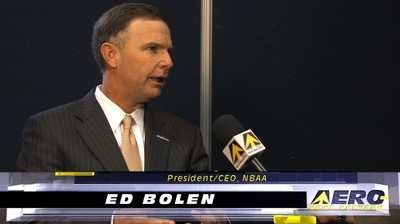Bolen Provides Testimony To The House Transportation Committee Wednesday
In testimony Wednesday before the House Transportation Committee, NBAA president and CEO Ed Bolen reminded lawmakers that proposals for privatizing air traffic control (ATC) could allow the nation’s big airlines to obtain sweeping authority over the nation’s aviation system, at a cost to the citizens, businesses and towns that depend on general aviation.

“Companies and communities across the U.S., which rely on general aviation for business, civil services and a host of other needs, simply cannot risk turning over the system to a private board beyond the reach of Congress,” Bolen said in written in testimony provided in conjunction with a hearing about ATC privatization, held Wednesday by the U.S. House Transportation & Infrastructure Committee.
Proposals for privatizing ATC, long-championed by the big airlines, have been promoted as part of the continuing congressional debate over reauthorization of funding and programs for the Federal Aviation Administration (FAA). Under such proposals, congressional oversight of the nation’s aviation system would be replaced by an entity governed by a private board of directors.
“It sounds absurd,” Bolen continued, “However, that is what the airlines are seeking to do: wrest control of the nation’s air traffic system away from the public’s elected representatives and give it away, for free, to a private board. If the system is privatized, who will effectively control this monopoly, and for whose benefit?
"Concerns over the answer to that question have been raised by aviation groups, organizations on the political left and right, members from both sides of the aisle in the House and Senate, mayors from across the country and a majority of American citizens," he continued.
Bolen noted that among the many potentially harmful consequences of ATC privatization are the possibility that access to the nation’s airports and airspace could become restricted, and that a private entity could be empowered with taxing authority.
“What makes the U.S. air transportation system so unique and special is that it serves all Americans, in communities large and small,” Bolen said. “That is very much at risk if we move to a private ATC system,” he added, noting that the focus on commercial airline operations at large hub airports creates airport and airspace access restrictions for business aviation in countries with privatized ATC systems.
“In addition to jeopardizing access for general aviation, proponents of privatization want to give power to a board with the authority to determine who gets taxed, and in what amounts,” Bolen continued. “John Marshall, the first Chief Justice of the Supreme Court, had it right when he famously wrote that the ‘power to tax is the power to destroy.’ Today, that authority resides with the American public’s elected representatives. Congress should not abdicate, delegate or outsource its responsibility in the areas of aviation taxes and fees.”
Bolen pointed out that America’s “dynamic and innovative” ATC system is the world’s largest, most diverse and safest, adding that business aviation plays a key role in that transportation system, and in the nation’s economy, helping support more than 1 million jobs and $219 billion in economic activity.
Regarding aviation system modernization, Bolen said NBAA and its members “stand at the forefront of promoting forward-looking policies, and emerging technologies” in the system.
“Let's set aside the many concerns over ATC privatization by setting aside the concept altogether,” Bolen concluded. “Let's seek targeted solutions to the FAA’s identified challenges, so that we continue to be the world leader in aviation five, 10, and 25 years from now."
(Source: NBAA news release. Image from file)
 ANN's Daily Aero-Linx (04.16.24)
ANN's Daily Aero-Linx (04.16.24) Aero-News: Quote of the Day (04.16.24)
Aero-News: Quote of the Day (04.16.24) Airborne 04.10.24: SnF24!, A50 Heritage Reveal, HeliCycle!, Montaer MC-01
Airborne 04.10.24: SnF24!, A50 Heritage Reveal, HeliCycle!, Montaer MC-01 Airborne 04.12.24: SnF24!, G100UL Is Here, Holy Micro, Plane Tags
Airborne 04.12.24: SnF24!, G100UL Is Here, Holy Micro, Plane Tags Airborne-Flight Training 04.17.24: Feds Need Controllers, Spirit Delay, Redbird
Airborne-Flight Training 04.17.24: Feds Need Controllers, Spirit Delay, Redbird



